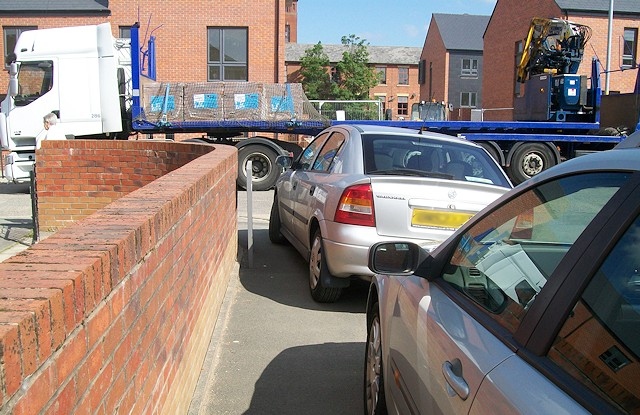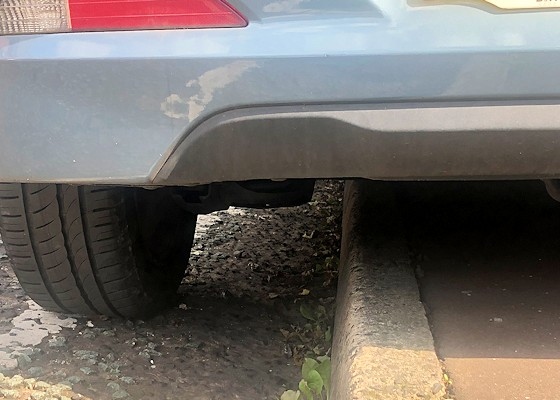Parking on pavements consultation launched by government
Date published: 01 September 2020

Parking on pavements affects people with visual or mobility impairments, those assisted by guide dogs, and wheelchair and mobility scooter users
Pavements could be made safer for people with disabilities, and families, under new proposals to ban antisocial parking unveiled by the government on Monday (31 August).
Parking on pavements disproportionately affects people with visual or mobility impairments, those assisted by guide dogs, and wheelchair and mobility scooter users. More than 95% of wheelchair users and people with visual impairments say they had problems with vehicles parked on pavements.
Three options are proposed in the consultation – improving the traffic regulation order process to make it easier for councils to prohibit pavement parking in their areas, giving councils powers to fine drivers who park on paths, and a London-style nationwide ban on pavement parking.
However, there is still a major role for cars and other private vehicles, so any future plans will need to take this into consideration.
Transport Secretary Grant Shapps said: “Parking on pavements means wheelchair users, visually impaired people and parents with pushchairs can be forced into the road, which is not only dangerous but discourages people from making journeys.
“A key part of our green, post-Covid recovery will be encouraging more people to choose active travel, such as walking, so it is vital that we make the nation’s pavements accessible for everyone.”
Pavement parking presents a safety risk when parked cars occupy too much of the pavement and force vulnerable pedestrians to move into the road.
Disabled people say pavement parking is a significant barrier to carrying out daily journeys. Recent research from the charity Guide Dogs shows that 32% of people with vision impairments and 48% of wheelchair users were less willing to go out on their own because of pavement parking, decreasing independence and contributing towards isolation.
As many streets were built decades and centuries before the high levels of vehicles currently on roads, any measures will need to ensure the free flow of traffic and access for the emergency services.

The consultation is the government’s latest step to deliver on commitments to make transport equally accessible for all users by 2030, as set out in the Inclusive Transport Strategy.
Stephen Edwards, Director of Policy and Communications at Living Streets, said: “We’re regularly contacted by disabled and older people who feel trapped in their homes because there is not enough room on the pavement for wheelchairs or mobility scooters.
“This has impacted more people during the pandemic with blocked pavements affecting everyone’s ability to physically distance.”
Blanche Shackleton, from the charity Guide Dogs, said: “For many people with sight loss, cars and vans parked on the pavement make our streets stressful and dangerous to navigate. At any time, you might be forced out into the road with traffic that you cannot see.
“When every journey is an ordeal, simply going out independently can become daunting.”
The consultation comes as Transport Secretary Grant Shapps steps up efforts to encourage active travel – such as walking – as part of a green, post-Covid-19 recovery, and level up road quality across the country.
The government announced £2 billion in May to get more people walking and cycling, and £2.5 billion in the Budget towards repairing potholes as part of the biggest nationwide programme ever announced.
On top of this, the government is also investing more than £27 billion to improve roads across the country and boost connectivity between our towns and cities.
It is currently an offence to cause an unnecessary obstruction on the highway, which is enforceable by the police.
Responding to the Department for Transport’s announcement to launch a consultation on pavement parking, Councillor David Renard, the Local Government Association’s transport spokesman, said: “Pavement parking and damaged pavements is one of the biggest complaints from pedestrians – and not just in London.
“The LGA has long-called for the ban on pavement parking to be extended to all areas of England, with councils able to make exemptions, so we are pleased government has launched this consultation.
“Councils share the government’s aim to promote active travel and this measure should make walking more attractive and safer for everyone, including vulnerable users.”
The consultation can be accessed at:
Do you have a story for us?
Let us know by emailing news@rochdaleonline.co.uk
All contact will be treated in confidence.
Most Viewed News Stories
To contact the Rochdale Online news desk, email news@rochdaleonline.co.uk or visit our news submission page.
To get the latest news on your desktop or mobile, follow Rochdale Online on Twitter and Facebook.


